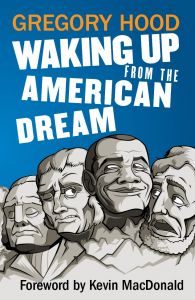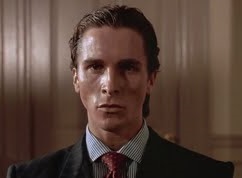Patrick Bateman: “Literally Me” or a Warning?
A lot has been said about Bret Easton Ellis’ American Psycho as well as Mary Harron’s screen adaptation. Many in our sphere love this story for a multitude of reasons, and many more dismiss it. Both sentiments have their merits, but I’d like to add yet another take: Patrick Bateman is what you get when you fully embrace the modern era’s decadence and status quo.
There are two extreme poles in viewpoints on the protagonist. On one side there are the “Bateman is literally me” types. This was analyzed by the YouTube film review channel The Kino Corner. Their idea is that people project themselves onto idealized or amplified personalities they idolize to a certain degree. It’s weird to think of anyone wanting to be Patrick Batemen, but this is often claimed to be an intentional or ironic exaggeration. Mainstream examples abound: Kanye West had trash TV personality Scott Disick reenact a scene from the film in a promotional video for one of his albums; the online comedy group CollegeHumor did a dick-joke parody of the business card scene; and even mega-star Margot Robbie made a video mimicking the film’s morning shower routine.
The other side of the spectrum are those who highlight Bateman’s dorkiness, which is certainly accurate. This is mentioned in a video essay included on the film’s special edition DVD. Director Mary Harron mocks men who liken themselves to Bateman, adding that the anti-hero should obviously be the last person someone would want to emulate. In a relatively recent interview about this film, Harron further stated, “One thing I liked about the novel . . . was the way it presented the character; there were a lot of scenes where he was kind of a buffoon.”[1]
Though this take is valid — being a murderous psycho is certainly a bad thing — there is something positive that can be said about Bateman. He has clearly gone “all in” on the norms of the 1980s: greed, success at all costs, and adherence to all the correct social, cultural, and political viewpoints. All the “literally me” types are, to a certain degree, correct in their desire to mimic a man breaking away from those orthodoxies that are highly detrimental to one’s well-being. Adhering to these does not work out well for Bateman. The more he doubles down, the more his body and mind reject it, as how the immune system attacks something that should not be there.
An example that best illustrates Bateman’s current-thing affiliation is his dinner-party monologue:
Well, we have to end apartheid for one. And slow down the nuclear arms race, stop terrorism and world hunger. But we can’t ignore our social needs, either. We have to stop people from abusing the welfare system. We have to provide food and shelter for the homeless and oppose racial discrimination and promote civil rights while also promoting equal rights for women but change the abortion laws to protect the right to life yet still somehow maintain women’s freedom of choice. We also have to control the influx of illegal immigrants. We have to encourage a return to traditional moral values and curb graphic sex and violence on TV, in movies, in pop music, everywhere. Most importantly we have to promote general social concern and less materialism in young people.[2]
Bateman clearly does not believe any of this, but he knows that he’s supposed to. He does not make this statement ironically, but says it with all the sincerity he wishes he had regarding all the various topics that are being discussed.
Another example of this forced conviction is in an exchange he has with a colleague:
PRICE: Lucky bastard.
McDERMOTT: Lucky Jew bastard.
BATEMAN: Oh Jesus, McDermott, what does that have to do with anything?
McDERMOTT: Listen. I’ve seen the bastard sitting in his office on the phone with CEOs, spinning a fucking menorah. The bastard brought a Hanukkah bush into the office last December.
BATEMAN: You spin a dreidel, McDermott, not a menorah. You spin a dreidel.
McDERMOTT: Oh my God. Bateman, do you want me to fry you up some fucking potato pancakes? Some latkes?
BATEMAN: No. Just cool it with the anti-Semitic remarks.[3]
Bateman is openly racist elsewhere in the novel, but he knows, according to the standards of his era, that he shouldn’t be. His mind goes one way while his subconscious goes in an entirely different direction, and he grows increasingly unstable as a result. A perfect example of this is in the chapter “A Glimpse of a Thursday Afternoon” where, presumably high on something, he wanders around Manhattan while going in and out of random stores, clearly unaware of his purpose and on the brink of collapse. His body is rejecting society, and society is rejecting him.
There are not many differences between the novel and the film, but Ellis himself was unhappy with the screen adaptation. He was quoted as saying that it “doesn’t really work as a movie.”[4] When speaking about all of his works that were eventually made into feature-length films, Ellis said:
My favorite movie out of the four was The Rules of Attraction. I thought it was the only one that captured the sensibility of the novel in a cinematic way. I know I’m sounding like a film critic on that, but I’m talking about that in an emotional way — as the writer of the novel. I watched that movie and thought they got it in a way that Mary Harron didn’t and Less than Zero didn’t.[5]
Regardless of what you think of Patrick Bateman, the quotes above show that the film was another example of a Hollywood director taking a work of literature and putting his own spin on it, usually for the worse.

You can buy Greg Hood’s Waking Up From the American Dream here.
Several Counter-Currents writers have weighed in on this film. In his 2013 analysis, Gregory Hood hits the nail on the head when he states that
Patrick Bateman is a stand-in for the greed and shallowness of the 1980s, a man who seeks control with aggressive value judgments over status, fashion, and popular culture but ultimately loses his very sense of self to the vicissitudes of consumerism. . . . What is important about Patrick Bateman is not whether he is actually a killer, but that his homicidal desires are the only authentic thing in the entire world around him.[6]
Nick Jeelvy provides a more humorous take in his essay entitled “Patrick Bateman is a Tranny.” Jeelvy’s antipathy for the “literally me” crowd is not without merit, and he further points out many young men’s eagerness to be seen as “sigma males” as well. He describes the Bateman character as a faux male” “Men instead find themselves shackled to the forms prescribed for them by the media, and so by rejecting their genuinely masculine fathers, they attach themselves to proto-troons like Patrick Bateman, who express the feminine through masculine forms.”[7] This was a view I hadn’t considered, but bastardizations of manliness are certainly a cultural norm in our current era — and are just as destructive as 1980s greed and consumerism once were.
It is amazing what your average NPC will consent to. Bateman himself reveals all when he says that he does what he does “[b]ecause . . . I . . . want . . . to . . . fit . . .in.”[8] We know what happens when someone puts all their eggs in the basket of whatever is being currently pushed by our depraved oligarchs: Some mutilate their genitalia and occasionally even commit suicide because of it, and some worship criminals but are unprepared to pay the consequences of doing so, screeching when things don’t go their way. And occasionally they even resort to murder — as Bateman also dreamed of doing.
* * *
Counter-Currents has extended special privileges to those who donate $120 or more per year.
- First, donor comments will appear immediately instead of waiting in a moderation queue. (People who abuse this privilege will lose it.)
- Second, donors will have immediate access to all Counter-Currents posts. Non-donors will find that one post a day, five posts a week will be behind a “Paywall” and will be available to the general public after 30 days.
- Third, Paywall members have the ability to edit their comments.
- Fourth, Paywall members can “commission” a yearly article from Counter-Currents. Just send a question that you’d like to have discussed to [email protected]. (Obviously, the topics must be suitable to Counter-Currents and its broader project, as well as the interests and expertise of our writers.)
To get full access to all content behind the paywall, sign up here:
Paywall Gift Subscriptions
 If you are already behind the paywall and want to share the benefits, Counter-Currents also offers paywall gift subscriptions. We need just five things from you:
If you are already behind the paywall and want to share the benefits, Counter-Currents also offers paywall gift subscriptions. We need just five things from you:
- your payment
- the recipient’s name
- the recipient’s email address
- your name
- your email address
To register, just fill out this form and we will walk you through the payment and registration process. There are a number of different payment options.
Notes
[1] Simon Bland, “‘I saw Bateman as kind of a buffoon’ — Mary Harron on American Psycho at 20,” Little White Lies, April 14, 2020.
[2] Bret Easton Ellis, American Psycho (New York: Vintage Books, 1991), 16.
[3] Ibid., 36-37.
[4] Jack Giroux, “Bret Easton Ellis: ‘American Psycho’ Doesn’t Work as a Movie,” Film School Rejects, August 7, 2013.
[5] Wyatt Williams, “Bret Easton Ellis talks film adaptations at SCAD,” Creative Loafing, June 19, 2010.
[6] Gregory Hood, “American Psycho,” Counter-Currents, January 22, 2013.
[7] Nicholas R. Jeelvy, “Patrick Bateman is a Tranny,” Counter-Currents, June 14, 2022.
[8] Ellis, American Psycho, 237.



